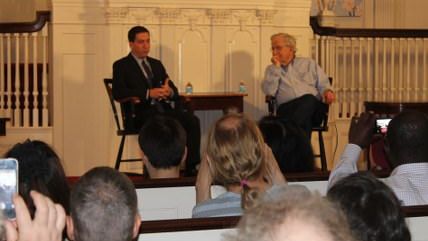Greenwald and Chomsky Smack Down Surveillance State Talking Points
Tackling the attacks on Edward Snowden and the complicit media

Fittingly for an event held in a church, journalist Glenn Greenwald spoke with an almost evangelical tone about the effects of working with Edward Snowden in revealing the extent and scale of the National Security Agency's (NSA) unconstitutional, illegal, and unaccountable mass surveillance program.
"Whatever else we think about Edward Snowden, when I met him he was 29, he came from a lower-middle-class family … he was as ordinary as it gets," Greenwald told the audience of around 500 in the Unitarian Universalist First Parish Church in Cambridge, Massachusetts, Thursday. "He was just an ordinary individual who managed to change the world. No matter who you are, we all have within us the ability to effect radical and fundamental change."
Greenwald was there to promote his new book, No Place to Hide, and he shared the stage with author and intellectual Noam Chomsky to discuss the issues raised by the documents Snowden provided.
"Almost every significant change was spurred by isolated individuals deciding to take a stand," Chomsky said, noting that the resistance to the Indonesian occupation of East Timor began in such a way. "It's not easy being attacked and killed."
They also discussed the American media's response to Snowden's revealing himself in Hong Kong last June.
"If you're somebody who enjoys bashing the American media … it comes as no surprise that the American media disseminates wildly inaccurate stories," Greenwald said. "It has been a truly remarkable experience to watch people in public life … spout all sorts of falsehoods."
He said he has dismissed the idea of media outlets plotting together, but felt it was still astounding how quickly the pundits and reporters came to conclusions about Snowden based on nothing. He said that the first response was to accuse him of being a Chinese spy, because he was in Hong Kong, and then he was accused of being a Russian spy after getting stuck in Moscow when the United States revoked his passport.
"Tomorrow if he flew to Lima these same people would say he is a Peruvian agent," Greenwald said.
In addition to being vilified as a traitor by the right, Greenwald said he and Snowden had been criticized from the left for not releasing all the documents at once, like WikiLeaks.
Greenwald said Snowden had clear ideas about how to report the documents, and he wanted to learn the lessons of previous whistle-blowers, like Thomas Drake. Snowden wanted to "let each story breathe."
He added that going back through everything in the course of writing the book, he was surprised by how quickly the narrative consensus that Snowden was a "fame-seeking narcissist" was reached, especially since there was nothing to support it. He said that, for months, bookers for prime-time television news shows were calling him, trying to get access to Snowden, but he had no interest in doing those interviews.
"He could have spent months on prime-time television, and to date he has never given an interview to American television," Greenwald said. "That is how much he wants to keep the focus on the substance of the revelations."
Chomsky pointed out that all the spying and surveillance by the NSA had resulted in only one prosecution, of someone who sent money to Somalia. He was referring to the case of Basaaly Moalin, a cab driver from San Diego who was convicted of sending $8,500 to Somali al-Qaeda affiliate al-Shabbab.
Greenwald also said he was annoyed at journalists who "put on their serious faces" when interviewing officials like former NSA director Gen. Keith Alexander's who contend that the leaks put lives at risk—and then being completely uncritical of Alexander's statements.
"There is no awareness that for virtually the last 50 years the same script is read from and proved to be false," he said.
"That tells you whose security is being protected: the security of the state power," Chomsky said. "It's making sure that power can operate in the dark."
He said that governments keep searching for external threats to justify their secrecy, mentioning a book called Washington's China showing how throughout the Cold War the National Security Council decided China was a threat, but kept changing the justification for doing so.
"No matter what the facts were, you always had the same conclusion," Chomsky said.
More importantly, Chomsky said, the broadening of government powers in response to putative threats sets a precedent for each successive president.
"What does Obama gain from pressing home an attack on civil liberties?" he said.
However, Greenwald was more optimistic: "Interest in this topic is more sustained and more intense than it was in June last year," he said. "There are lots of changes in the United States, but there has been more change in the dynamic internationally."
He pointed to Brazilian President Dilma Rousseff denouncing the United States at the United Nations as an example of the changes wrought by publishing the documents, since Brazil had usually been a follower of American policy.
"When you start changing consciousness, fundamental change will emerge," Greenwald said.
He added that the fearlessness exhibited by Snowden had been inspiring and had also inspired his then-colleagues at The Guardian.
An audience member asked about his experiences of government harassment and he replied, "When they show their thuggish face, it spurs me on."
Start your day with Reason. Get a daily brief of the most important stories and trends every weekday morning when you subscribe to Reason Roundup.


Show Comments (59)